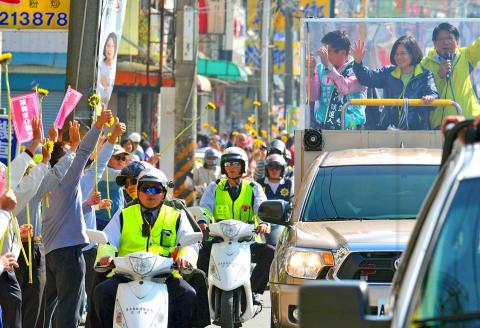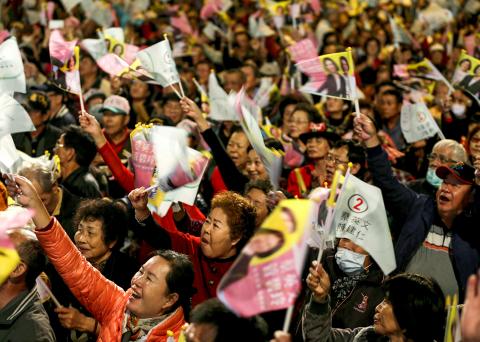Amid good-luck wishes yesterday from people in Fenggang Village (楓港) in Pingtung County’s Fangshan Township (枋山), her parents’ home town, Democratic Progressive Party (DPP) presidential candidate Tsai Ing-wen (蔡英文) paraded through Pingtung and Kaohsiung, greeted by supporters along the way, launching her final-week nationwide campaign tour before the presidential election on Saturday.
“Four years ago, I started my presidential campaign trip along Provincial Highway No. 1 from Fenggang. Four years later, I have returned to my hometown, Pingtung. From here I will start my week-long campaign trip,” Tsai told more than 100 people in the small coastal village with a population of a little over 1,000 who gathered in front of the local Delong Temple (德隆宮). “I could feel the desire of the people in Pingtung to elect a president from here.”
“Please give me the best election outcome,” Tsai said, urging her supporters to also support the DPP’s district and legislator-at-large candidates.

Photo: AFP / Sam Yeh
Among the supporters, Tsai’s uncle, aunt and cousin were also in attendance. Her uncle and aunt brought Tsai a gift of zongzi (粽子, rice dumplings), which symbolize victory in Taiwanese culture.
Prior to Tsai’s arrival, the temple leaders walked around the facility to make sure that everything was well prepared “to welcome our President Tsai.”
Before speaking to the crowd, Tsai went into the temple to make offerings to the deities.

Photo: EPA / Ritchie B. Tongo
The temple master gave Tsai a flag with the temple’s and the deity’s name on it to express their goodwill, while two Paiwan leaders presented traditional headwear and a vest with a totem to recognize her as a “daughter of the Paiwan people,” as her grandmother was a Paiwan Aborigine.
Following a rally to launch the nationwide tour, Tsai, accompanied by DPP legislative candidate Chung Chia-pin (鍾佳濱) and Pingtung County Commissioner Pan Meng-an (潘孟安), paraded through Linluo Township (麟洛) and neighboring Pingtung City.
“Dear friends and fellow Pingtung residents, Tsai Ing-wen is here in person, greeting all of you,” a campaigner said through loudspeaker.
“Please vote for Tsai to make Pingtung the home county of the president,” the campaigner said.
The announcements were made in Hakka while the parade was in Linluo, as it is a predominantly Hakka township, and switched to Hoklo (commonly known as Taiwanese) as the parade crossed into Pingtung City, which is a predominantly Hoklo-speaking area.
Supporters gathered in groups along the parade route, waving flags, giving the thumbs-up gesture and screaming as the jeep carrying Tsai, Chung and Pan passed by.
“Mom, Tsai is coming. Look, I see her,” shouted a girl who stood outside a restaurant with her family waiting for the parade to pass, pointing to the direction that Tsai was coming from.
After the parade in Pingtung, Tsai accompanied the DPP’s Kaohsiung legislative candidates in a parade through the city and finished the day with an evening rally in Kaohsiung, which event organizers said had a turnout of 100,000 people.

NATIONAL SECURITY THREAT: An official said that Guan Guan’s comments had gone beyond the threshold of free speech, as she advocated for the destruction of the ROC China-born media influencer Guan Guan’s (關關) residency permit has been revoked for repeatedly posting pro-China content that threatens national security, the National Immigration Agency said yesterday. Guan Guan has said many controversial things in her videos posted to Douyin (抖音), including “the red flag will soon be painted all over Taiwan” and “Taiwan is an inseparable part of China,” while expressing hope for expedited “reunification.” The agency received multiple reports alleging that Guan Guan had advocated for armed reunification last year. After investigating, the agency last month issued a notice requiring her to appear and account for her actions. Guan Guan appeared as required,

A Vietnamese migrant worker yesterday won NT$12 million (US$379,627) on a Lunar New Year scratch card in Kaohsiung as part of Taiwan Lottery Co’s (台灣彩券) “NT$12 Million Grand Fortune” (1200萬大吉利) game. The man was the first top-prize winner of the new game launched on Jan. 6 to mark the Lunar New Year. Three Vietnamese migrant workers visited a Taiwan Lottery shop on Xinyue Street in Kaohsiung’s Gangshan District (崗山), a store representative said. The player bought multiple tickets and, after winning nothing, held the final lottery ticket in one hand and rubbed the store’s statue of the Maitreya Buddha’s belly with the other,

‘NATO-PLUS’: ‘Our strategic partners in the Indo-Pacific are facing increasing aggression by the Chinese Communist Party,’ US Representative Rob Wittman said The US House of Representatives on Monday released its version of the Consolidated Appropriations Act, which includes US$1.15 billion to support security cooperation with Taiwan. The omnibus act, covering US$1.2 trillion of spending, allocates US$1 billion for the Taiwan Security Cooperation Initiative, as well as US$150 million for the replacement of defense articles and reimbursement of defense services provided to Taiwan. The fund allocations were based on the US National Defense Authorization Act for fiscal 2026 that was passed by the US Congress last month and authorized up to US$1 billion to the US Defense Security Cooperation Agency in support of the

CLASSIFIED BRIEFING: The ministry said the special budget focuses on building a comprehensive defense system and strengthening the domestic defense industry The Ministry of National Defense yesterday released information on seven categories of weapons systems to be procured under a stalled NT$1.25 trillion (US$39.57 billion) special defense budget, including precision artillery, long-range missiles, air defense anti-tank missiles and more than 200,000 uncrewed aerial vehicles (UAVs). The Executive Yuan approved a draft version of the budget on Nov. 27 last year and submitted it to the legislature for review. The legislature’s Foreign Affairs and National Defense Committee yesterday invited Minister of National Defense Wellington Koo (顧立雄) to deliver a classified briefing and answer questions at a closed-door session. Koo said he hoped to provide lawmakers